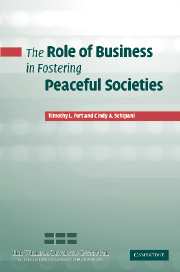Book contents
- Frontmatter
- Contents
- List of tables
- Acknowledgements
- Introduction
- Part I The plausibility of connecting business and peace
- 1 The role of business in fostering sustainable peace
- 2 Balances of power and mediators of justice
- Part II Current standards and their amenability to peace
- Part III Two illustrative issues: gender equality and ecology
- Conclusion
- Index
1 - The role of business in fostering sustainable peace
Published online by Cambridge University Press: 22 September 2009
- Frontmatter
- Contents
- List of tables
- Acknowledgements
- Introduction
- Part I The plausibility of connecting business and peace
- 1 The role of business in fostering sustainable peace
- 2 Balances of power and mediators of justice
- Part II Current standards and their amenability to peace
- Part III Two illustrative issues: gender equality and ecology
- Conclusion
- Index
Summary
On May 20, 2001, a front-page New York Times news story reported that Hindus in scattered areas of the world protested McDonald's decision to cook its French fries in beef fat, despite announcing in 1990 that it would cook its fries only in vegetable oil. As a result, “[T]he news ricocheted to India, where restaurant windows were smashed, statues of Ronald McDonald were smeared with cow dung, and Hindu nationalist politicians called for the chain to be evicted from the country.” The controversy is not the first McDonald's has faced. A well-toned Prince Philip of Great Britain stated, “You people [McDonald's] are destroying the rainforests of the world by grazing your cheap cattle.” And even as McDonald's CEO, Jack Greenberg, acknowledged and defended McDonald's record, the company faces challenges on issues from undermining local farmers, threatening local culture, using genetically modified organisms in its food, relying on hormonally treated beef, opposing local unionization, distributing unsafe toys to children, and employing child labor. Such a seemingly ubiquitous problem-causing image may be why another journal not known for its left-leaning views, The Economist, jokingly began a recent story with “Scientists at the McDonald's Centre for Obesity Research suggest that eating a hamburger a day actually reduces cholesterol levels.” This appeared in a story suggesting that the scientific community is beholden to the corporations funding its research.
- Type
- Chapter
- Information
- The Role of Business in Fostering Peaceful Societies , pp. 11 - 40Publisher: Cambridge University PressPrint publication year: 2004

